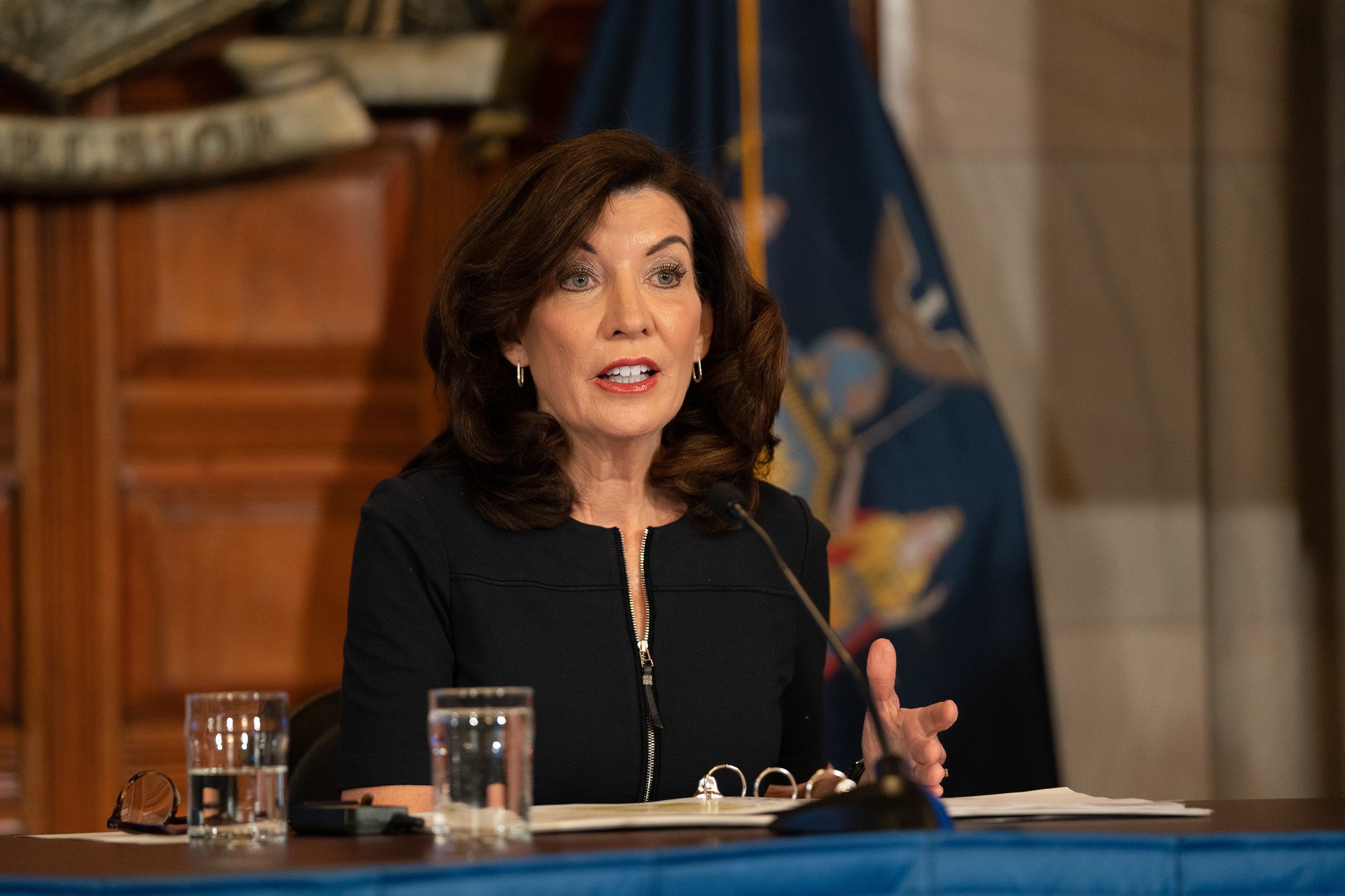Hochul grants 10 clemencies
/Governor Kathy Hochul granted clemency to 10 people on Christmas Eve. Photo via Hochul/Flickr
By Jacob Kaye
Governor Kathy Hochul granted clemency to 10 New Yorkers on Christmas Eve, marking the first time she’s used the power afforded only to the state’s top executive since taking office in August.
Clemencies can take the form of pardons, given to people who have already served their prison time, or commutations, given to people who are currently serving time in prison. Of the 10 clemencies granted, nine were given to immigrant New Yorkers with criminal records that threatened their ability to stay in the U.S.
Ana Sanchez Ventura, Juan Vinas, Faustino Reyes, Sandra Williams, Francisco Vargas, Orlando Fernandez Taveras, Hanley Gomez, Juan Suazo and Edilberta Reyes Canales were all pardoned by Hochul on Dec. 24.
In Reyes Canales’ case, the pardon will likely go a long way in helping her avoid deportation, according to the governor – Reyes Canales is facing an upcoming deportation hearing.
Hochul also commuted the sentence of Roger Cole, a 55-year-old man who was serving an 85 to 100 year sentence. Cole, who earned his GED, an Associate degree and multiple certifications, has been in prison for over three decades.
"As governor, I have a unique and solemn responsibility to carefully use the power of clemency to address individuals in the criminal justice system who have made mistakes and have taken extraordinary steps to rehabilitate themselves," Hochul said in a statement. "I am granting clemency to these deserving individuals who have exemplified rehabilitation, and I am committed to increased transparency and accountability in this process going forward. No one should be defined by their worst mistake, and these individuals have worked tirelessly to atone for theirs."
Criminal justice reform advocates called on Hochul – as they did to former Governor Andrew Cuomo – to do more in respect to her clemency powers. As the COVID-19 pandemic continues to ravage prisons and jails throughout the state, advocates say releasing incarcerated people, particularly those who are older, is a matter of life and death.
Beyond the present danger presented by the virus, reformers have been engaged in a years-long campaign to commute the sentences of older prisoners and give them opportunities to have their cases brought before a reformed parole board.
Jose Saldana, the director of the Release Aging People in Prison Campaign, said he was let down by the fact that Hochul used her commuting powers to end the sentence of only one New Yorker.
“Today, Governor Hochul has drastically failed Black and Latinx communities by only granting clemency to one incarcerated New Yorker,” Saldana said. “While we welcome home that person and celebrate for their loved ones, and we also recognize the life-saving value of the pardons granted to people long since released, we are heartbroken knowing that so many of our mothers, fathers, grandmothers and grandfathers are suffering behind bars and facing a slow death penalty.”
“Hochul didn’t grant a single clemency to an incarcerated woman, and her bare minimum action means that thousands of elders continue to needlessly languish behind bars,” he added. “Instead of talking about what she will do, we call on her to take real action now and moving forward by granting far more clemencies to incarcerated New Yorkers frequently, inclusively, and transparently.”
The fight to get the governor to use their clemency powers more, predates Hochul. Cuomo didn’t grant clemency during his first four years in office. By the time he left office, he had granted clemency to 41 New Yorkers after receiving at least 16,000 clemency applications, according to RAPP. Five of those clemencies came during his final days in office.
Steve Zeidman, an attorney and professor at the CUNY School of Law, told the Eagle in August that commutations and pardons are often granted around the holidays. Clemency’s association with the holiday season is something he sees as arbitrary and unnecessary.
“It's supposed to be this act of mercy consistent with the holidays and the new year, but it seems to me that someone who merits clemency on Dec. 24, surely they merited it on Nov. 24, Oct, 3, June 5, pick your date,” Zeidman said.
Hochul’s clemencies also come after a weeks-long social media campaign, where social media users shared photos of themselves asking the governor to “bring them home.”
Hochul responded last week by promising to institute a series of reforms to make clemencies more common.
The governor said she’d commit extra staff resources to reviewing applications, a process she hopes will lead to clemencies being granted on a rolling basis.
Additionally, Hochul said that in order to “improve transparency in the clemency application and review process,” her office will release the number of clemency applications that have been delivered in the past year, how many have been granted and how many have been denied, each time she grants an application.
She also vowed to communicate with applicants whose cases are open and under review and provide them with updates and information about how to submit additional information for their application.
Lastly, Hochul said her office will work with the Executive Clemency Bureau, a body within the state’s Department of Corrections and Community Supervision, to “provide improved guidance to clemency applicants about what information they should include in their applications and how they should make the Governor’s office aware of changes in their circumstances that may impact their case.”




